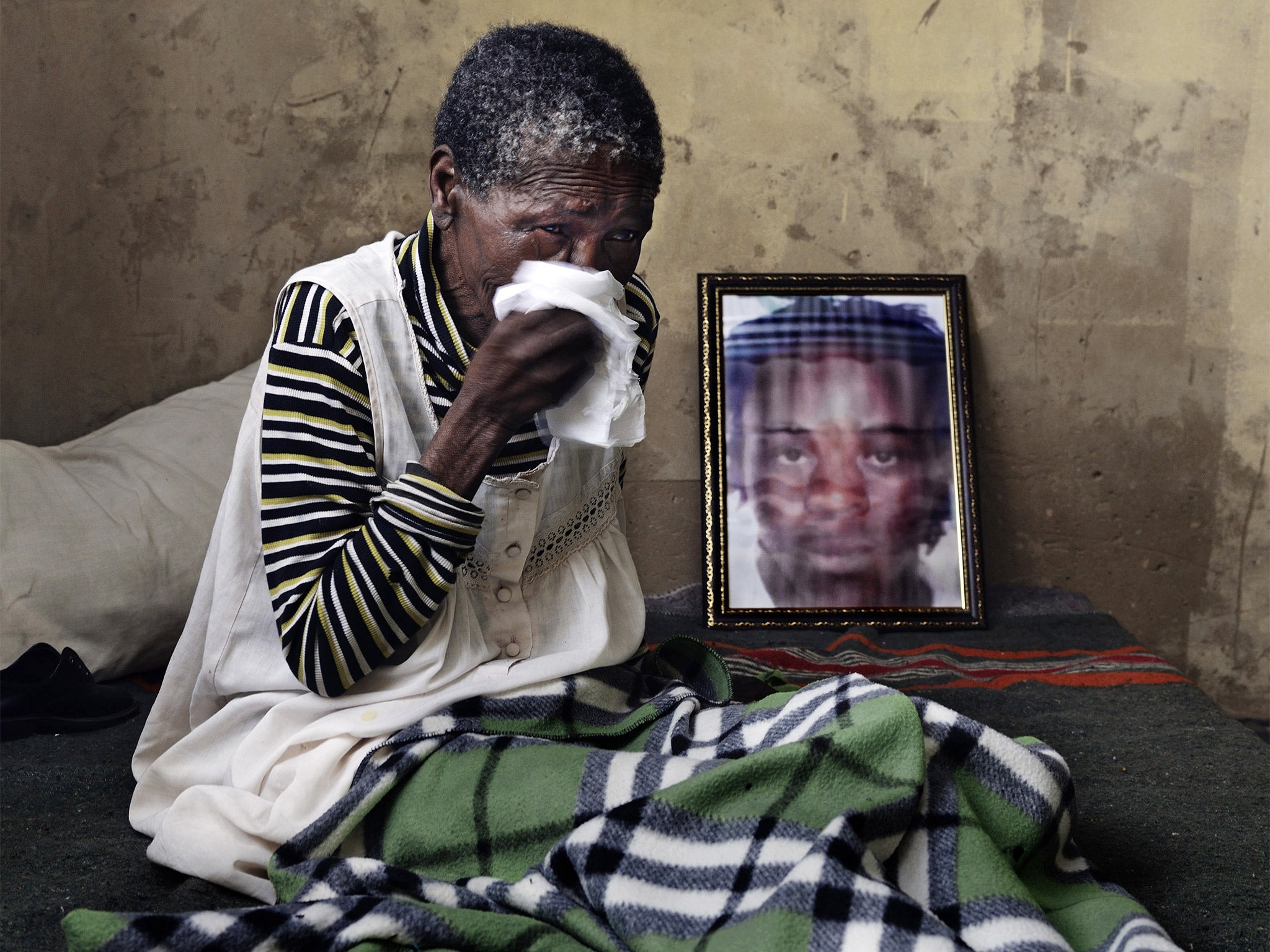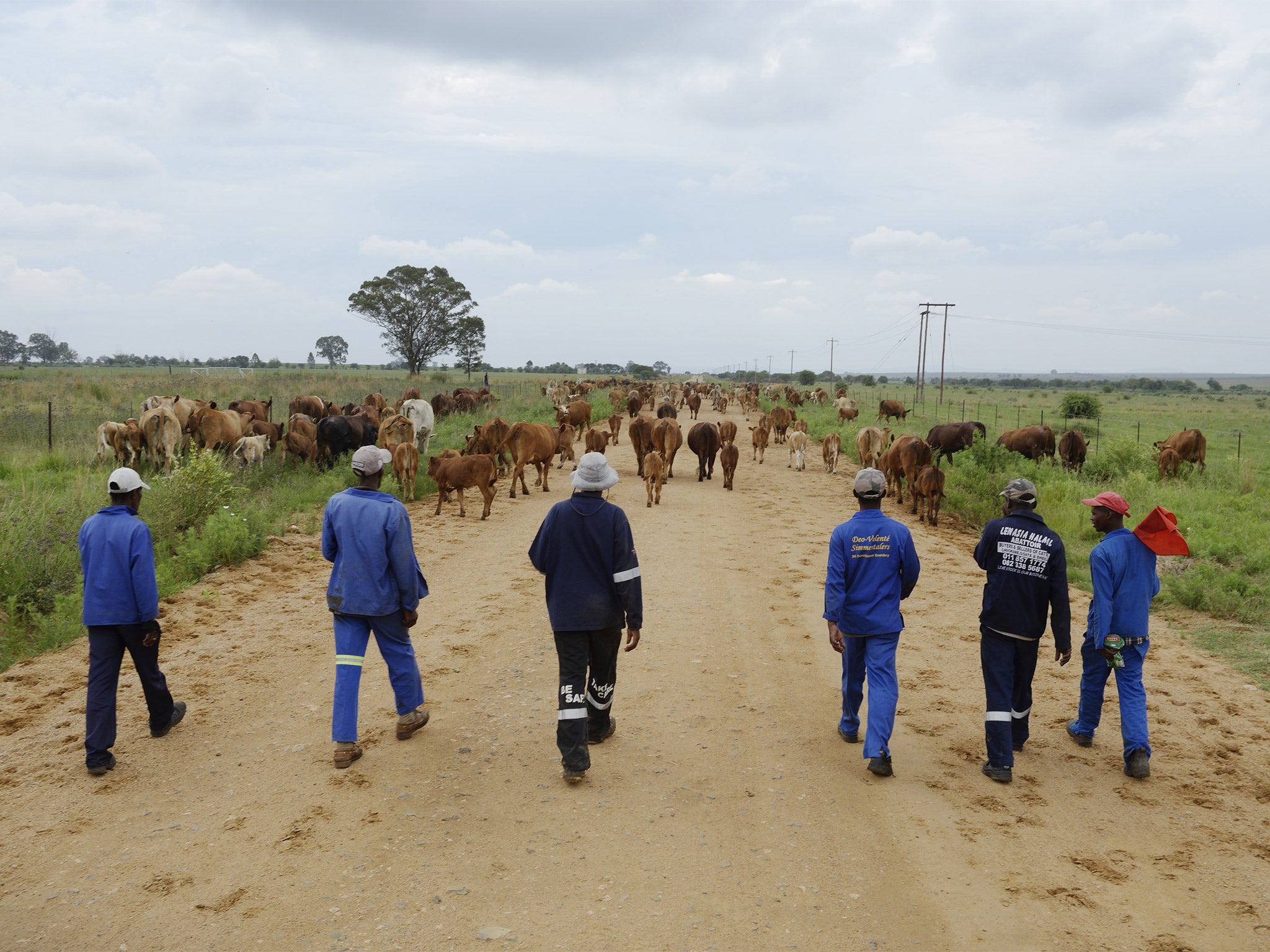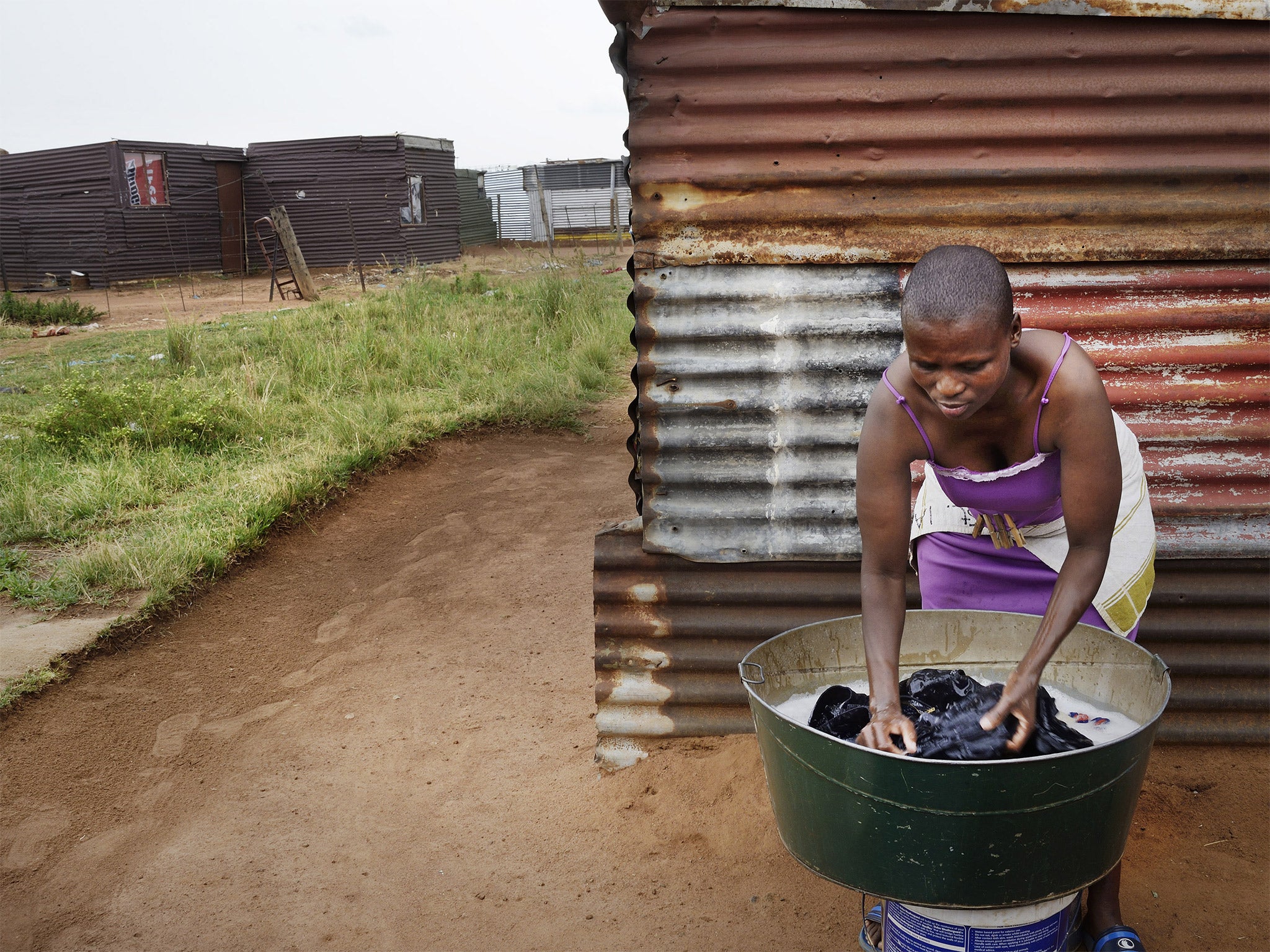South Africa: Trial of four white farmers and a policeman for the murder of two black men highlights the racial divisions still haunting the rainbow nation
The end of apartheid 22 years ago meant to many the start of social and economic equality. But today, whites earn on average six times what blacks do and lucrative industries of agriculture, mining and banking are dominated by whites

Your support helps us to tell the story
From reproductive rights to climate change to Big Tech, The Independent is on the ground when the story is developing. Whether it's investigating the financials of Elon Musk's pro-Trump PAC or producing our latest documentary, 'The A Word', which shines a light on the American women fighting for reproductive rights, we know how important it is to parse out the facts from the messaging.
At such a critical moment in US history, we need reporters on the ground. Your donation allows us to keep sending journalists to speak to both sides of the story.
The Independent is trusted by Americans across the entire political spectrum. And unlike many other quality news outlets, we choose not to lock Americans out of our reporting and analysis with paywalls. We believe quality journalism should be available to everyone, paid for by those who can afford it.
Your support makes all the difference.They lived in a township where homes were decorated with pictures of Nelson Mandela and neighbourhoods were named after anti-apartheid activists. A poster hung in city hall said: “We restored the dignity of our people.” The mayor and the police chief and the country’s President were black, like them.
But when Samuel Tjexa, 35, and Seun Tangasha, 25, bolted through the fields of the small city of Parys, it was four white farmers who chased them with guns. And it was those white farmers who allegedly beat Mr Tjexa and Mr Tangasha to death, in a case that has highlighted racial divisions haunting the new South Africa.
Twenty-two years after apartheid, this country is in the midst of another racial reckoning, evident in the recent uproar over a white woman’s Facebook post that called black beachgoers “monkeys”. The ruling party, the African National Congress (ANC), is trying to pass an “anti-racism” law that would jail anyone guilty of “racial bigotry”. An increasingly popular opposition group, the Economic Freedom Fighters, has called for a crusade against “white supremacy”.
The small farming city 60 miles outside Johannesburg offers a glimpse into the tensions flaring again in South Africa. When the four accused farmers had a bail hearing in their murder trial last month, whites and blacks gathered at the courthouse, separated by barbed wire. “I could see the anger in their eyes,” said George de Beer, a white farmer. “They looked at us like we were nothing,” said Ruth Qokotha, Mr Tjexa’s mother.
The whites sang the apartheid-era national anthem and held the flags of the 19th-century Boer Republics. The blacks shouted: “Kill the Boer! Kill the farmer!” - a reference to South African whites of Dutch descent.
Like many parts of South Africa, Parys has evolved little since apartheid. Blacks live mostly in a sprawling township called Tumahole, next to a rubbish dump, and whites live in a part of the city lined with antique stores, hotels and government buildings. There are 65 commercial farmers, all white. In many cases, black farm labourers work for the same families their great-grandparents did.
“We were expecting change. We were expecting to live together. But nothing changed at all,” said Paul Oliphant, 48, a welder in Tumahole.
The end of apartheid – “apartness” in Afrikaans – meant to many the start of social and economic equality in South Africa. Farm workers could become farmers. Poor blacks could move from townships into the same neighbourhoods as whites. In some places, this occurred. A black middle class and an ultra-rich elite formed. The government mandated that private companies hire a certain portion of black employees.
But today, whites, who make up about 9 per cent of the population, earn about six times what blacks do on average. The lucrative industries of agriculture, mining and banking are dominated by whites.
The continued economic inequality has contributed to a new wave of racial tension. The South African Human Rights Commission received 160 racism-related complaints in January, the highest monthly figure in its 20-year history, officials say.
Some say the ANC is using race to its political advantage, accusing its opponents of being anti-black to increase support from its base. The party’s proposed anti-racism law has only been vaguely described but is intended to ensure that “acts of racism and promotion of apartheid are criminalised and punishable by imprisonment”.
“The [ANC] organisation is not in a strong state at this stage, and it needs an external enemy against which it can unite its own followers,” said Susan Booysen, a political scientist at the University of the Witwatersrand and the author of a recent book on the ANC.

White farmers say they are the ones under threat, their farms raided and their families attacked in crimes that often feel like the expression of racial outrage. In 2014, black men in Parys raped an elderly woman and put her body in a freezer, where she died. The previous year, a white farmer was killed when intruders dragged him behind his truck. Last year, members of a primarily white group, the Transvaal Agricultural Union, complained to the UN Human Rights Council in Geneva that white farmers in South Africa were a persecuted minority. Sixty-two people were murdered during 270 farm attacks in 2015, according to the farmers, who say the number is growing.
“In some ways it feels like there’s more tension now than there was during apartheid,” said Wynn Dedwith, a farmer in Parys. “All it takes is a little spark to ignite a keg of dynamite.”
The spark came just before sunset on 6 January when Mr Tjexa and Mr Tangasha approached their boss on his farm outside central Parys.
According to the 72-year-old farmer, Loedie van der Westhuizen, the men were armed with revolvers and were there to rob him of around £800. According to the families of Mr Tjexa and Mr Tangasha, they had gone unarmed to collect overdue wages, about $50 each. The police have found no weapons in their investigation.
The farmer told investigators that the two men hit him on the head and the torso until he managed to trigger a security alarm. That alarm alerted nearby farmers who had formed a self-defence force. They chased the men to a field near a maize farm.
“We got the message that the two attackers were on the run,” said Pieter Kemp, a farmer who helps co-ordinate the force. “There were a lot of us looking for them. Until that point, the system worked the way it was supposed to.”

When police arrived, they found the black men had been brutally beaten. They both died within hours. The alleged assailants have not entered a plea. “For us, the reality facing farmers can sometimes lead to an overreaction,” said Ernst Roets, deputy chief executive of AfriForum, an Afrikaner advocacy group helping to defend the accused farmers. “You have a friend who was killed, or you know the lady who was put into the freezer, and maybe you think, ‘Finally, we caught the bastards.’”
Qokotha, Mr Tjexa’s mother, heard the news from a friend. “The whites think they can do anything here,” she said. “It’s still apartheid.”
The whites called into their local Afrikaans-language radio station, Koepel Stereo, and spoke about the threat of more farm attacks and their sense of insecurity.
“We’re being killed like flies,” said the host, Sakkie van der Schyff. “The only reason you aren’t seeing a revolt by the whites is that we’re good Christians.”
The blacks called into Lentswe Community Radio, their own station three miles away, furious that the four farmers were granted bail. “If these guys are acquitted, there will be revenge,” said Seun Tladi, its newsreader.
At his presidential inauguration in 1994, Nelson Mandela spoke of a “rainbow nation at peace with itself and the world”. Tangasha was a toddler when that speech was delivered, living with his family in the Free State, in South Africa’s breadbasket. His parents, like almost all black South Africans in the 1990s and early 2000s, were supporters of the ANC, Mandela’s party.
Mr Tangasha was part of the generation that would profit from the rainbow nation, his grandmother remembers thinking. He would go to university. He would own a house, maybe a business. But, like most black South Africans, he dropped out of a crumbling public education system before he turned 16. He found work on a farm, earning about £6 a day. He was never paid on time, his relatives said.
He started voting for the Economic Freedom Fighters, the party led by firebrand Julius Malema, who said in a speech last year: “We want a total overhaul of the state. We want a state that is not scared of the white minority.”
The ANC had made attempts to provide for men such as Mr Tangasha in Tumahole. It purchased land that was meant to be parcelled out to black farmers. But the farm equipment never arrived. Neither did the fertiliser.
Ironically, the white farmers have thrived under the ANC, which removed apartheid-era price controls and in some cases enabled them to increase their profit margins. Unlike in Zimbabwe, where white-owned farms were seized by force, the South African government has said it will purchase land only from white landowners who choose to sell it. And unlike the Zimbabwean President Robert Mugabe, South African leaders, including Mandela, have emphasised the right to political representation but have spoken much less about economic equality.
Experts say Mandela was concerned about upsetting economic stability during a fragile time. “Farmworkers imagined that when we had a democratic government with black politicians in power that their exploitation would go away,” said Moeletsi Mbeki, a political economist. “But that’s never what the democratic struggle was about.”
In recent weeks, the police have been trying to understand how and why Mr Tangasha and Mr Tjexa were killed. The investigating officer, Major Serame Mahlatsi, has been collecting accounts from the farmers, trying to follow the laws of the new South Africa amid the polarisation of the old one. He is a black police officer investigating white farmers. He knows it is a sensitive matter. In a brief interview, he showed a flash of exasperation. “You can’t take the law into your own hands,” he said. “You can’t just kill people.” But the situation turned out to be worse than even he imagined.
Just before the trial is to resume on 19 February, Mr Mahlatsi and his colleagues got a tip from a witness. One of their own, a 46-year-old white policeman named Hendrick Prinsloo, had allegedly helped the farmers beat the two victims at the scene. Mr Prinsloo was arrested and now stands trial as well.
© The Washington Post
Subscribe to Independent Premium to bookmark this article
Want to bookmark your favourite articles and stories to read or reference later? Start your Independent Premium subscription today.
Join our commenting forum
Join thought-provoking conversations, follow other Independent readers and see their replies
Comments